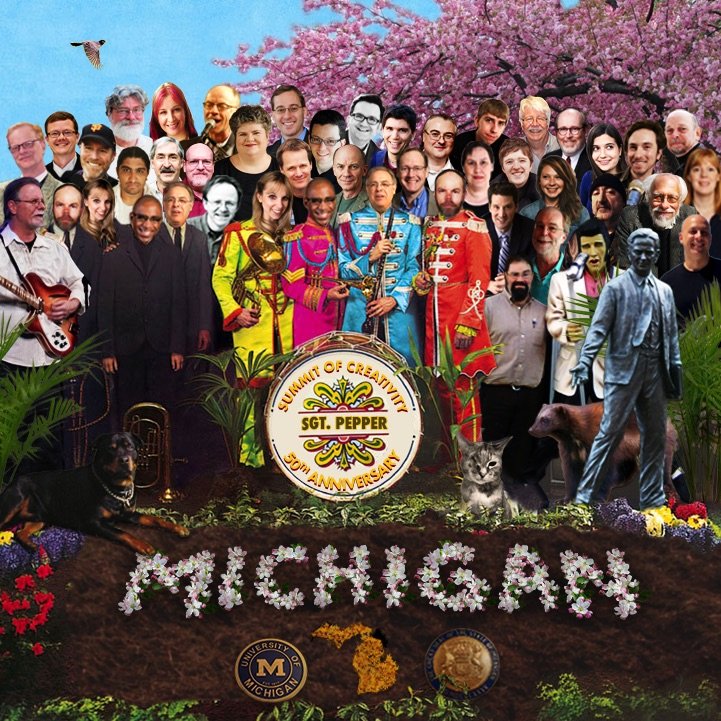Understanding Sgt. Pepper With a Little Help From Tim Riley

Associate Professor of Journalism Tim Riley knows one or two things about the Beatles. As the author of Tell Me Why: A Beatles Commentary (1988) and Lennon: The Man, The Myth, The Music (2011), he’s gone deep into the catalogue, the history, and the mythology of the world’s most legendary pop band.
This week, the 50th anniversary of the U.S. release of what has been called the most important album in rock, Riley travels to the University of Michigan to speak at “Summit of Creativity: A Celebration of the Fiftieth Anniversary of the Beatles’ Sgt. Pepper’s Lonely Hearts Club Band.”
Emerson College Today asked Riley to give us his thoughts on the album. To hear more of Riley’s insight on the Beatles, head over to wbur.org to read his commentary on “Sgt. Pepper at 50: What the Beatles Can Teach Us About Trump,” or listen to him on May 31’s edition of On Point, talking about “A Soundtrack to the Summer of Love, 50 Years Later.”
ECT: The title of your talk at the Michigan symposium is “Rethinking Sgt. Pepper.” Rethinking in what way?
TR: Well, I’ve written extensively about this album across two books already, and the more I teach this material, the more I learn about it. It’s the kind of music that grows on you in subtle ways over the years; you hear it differently when you’re younger, and now it feels as if we can never really hear to the bottom of these songs.
ECT: I read that Sgt. Pepper more or less was the first pop album that was treated as a piece of art by critics. Was that entirely based on the merits of the music, or were there other factors (cultural, commercial) that allowed that to happen?
TR: A combination, but as a critic you have to hold out for the value of the aesthetics. The fact that the Beatles had so much popular sway enabled them to indulge their art, which they never could have done at such time and expense if they hadn’t built up so much good faith in their audience. Then again, their previous record, Revolver, ranks even higher in some quarters and it never gets the same hype.
ECT: What’s one thing about Sgt. Pepper that you learned, in researching your Lennon book or for this symposium, that might surprise people?
TR: I had never noticed the maracas used on “A Day in the Life” until recently.
ECT: “A Day in the Life” is usually cited as the height of creativity and experimentation on the album. Is there a track you think gets unfairly overlooked?
TR: “Getting Better” keeps growing on me, I keep returning to that. And the new mix by Giles Martin gives more tooth to the harder edges, it bites more, especially the guitars and drums. The vocal harmonies keep leaping out anew, as well.
ECT: In an Esquire interview, Keith Richards called Sgt. Pepper a “mishmash of rubbish.” Sour grapes, or does he have a point?
TR: Well, it’s not his kind of record, and he proved that when he made [Their] Satanic Majesties Request. If there was ever a band to avoid psychedelia, that would be the Stones.
ECT: How has the album aged over the last 50 years? Do your students know it/like it?
TR: Many greet this music for the first time, and most find an appreciation for it even if they don’t embrace it as fully as their parents. [It’s] very hard to convey how profound the impact of music seemed on people’s lives back then, how invested they were and how each lyric seemed oracular. [There are] very few contemporary analogies. If you multiplied the effect of Harry Potter by about a million, you still wouldn’t come close to the Beatles’ all-encompassing presence.
ECT: You can only listen to one album for the rest of your life. Is it Sgt. Pepper?
TR: Right now, it’s Dylan’s Blonde on Blonde, but these things go in phases. It’s often Pepper, it’s also often the second album, With the Beatles, or Rubber Soul, or Revolver. It’s also quite often Andras Schiff’s recording of Bach’s Goldberg Variations. Or [the Beach Boys’] Pet Sounds. Or [the Rolling Stones’] Beggars Banquet. Or Exile [on Main St.]. Or [The Who’s] Quadrophenia. Or [Steely Dan’s] Countdown to Ecstasy.
Categories